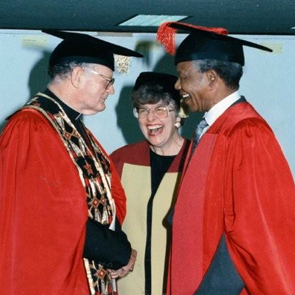Nelson Mandela regularly received Communion from a Catholic priest while he was a prisoner on Robben Island, The Tablet has learnt.
The anti-apartheid campaigner, who died last Thursday, attended Mass and received Communion from a Jesuit chaplain, although he was raised and registered as a Methodist, the provincial of the Jesuits in East Africa said.
Writing in this week’s Tablet, Fr Agbonkhianmeghe E. Orobator commented that has well as benefitting from the services of a Methodist chaplain, “I have reliable information that he also received regular visits from a Jesuit chaplain. According to my source, Mandela used to come to Mass and receive Communion.”
Fr Orobator noted that this “act of intercommunion, given his situation, would be licit under canon law”.
Christians from other denominations are permitted to receive Communion from a Catholic priest if they are unable to get to a Eucharistic service within their own tradition.
Fr Orobator said that while Mandela believed in God, he was not a fan of organised religion, but “like any astute politician, he knew the place of religion in politics and was not averse to using it as much as was necessary”.
“He counted notable religious figures among his friends and relied on the support of a confluence of religious traditions in his spirited and long-drawn struggle to dismantle the apartheid system.”
Among them was the late Archbishop of Durban, Denis Hurley, who met or had contact with Mandela on a number of occasions.
The first came in the early 1980s when Hurley was preparing for trial – he was charged for making “false statements” about atrocities committed in Namibia by “Koevoet”, a fearsome paramilitary police unit.
Writing from Pollsmoor Prison to then Archbishop of Cape Town, Stephen Naidoo CSsR, Mandela said: “Archbishop Hurley is often in my thoughts, especially now. I would like to him to know that.”
After Mandela’s release from prison he was given an honorary doctorate in Law by the University of Natal, of which Hurley was the chancellor. Witnesses said relations between the two men were “very warm”.
In 1994, when Mandela was inaugurated as the country’s first democratically elected president, the South African bishops’ conference sent Hurley as their official representative and in 1999, before he stepped down as President, Mandela conferred on Hurley one of the country’s then highest honours – the Order for Meritorious Service (Gold).
Hurley, who died in 2004, was also present at Mandela’s first rally in Durban at the King’s Park Stadium, saying at the time: “He spoke for nearly an hour, and what a speech it was: courteous, reconciling, sensitive, creative, forward looking and without resentment and rancour. After 27 years in prison, it was a magnificent plea for peace, understanding and co-operation.”
Read a tribute from the current archbishop of Durban, Cardinal Wilfrid Napier.
In this week’s print edition of The Tablet, Rustenburg Bishop Kevin Dowling assesses Mandela's legacy.
Above: Archbishop Hurley (left), as Chancellor of the University of Natal, enjoying a joke with Mandela and Professor Brenda Gourley, then the university's Vice Chancellor, after conferring a Honorary Doctorate in Law on the anti-apartheid campaigner, who died a week ago. Photo courtesy of Denis Hurley Centre, Durban




 Loading ...
Loading ...